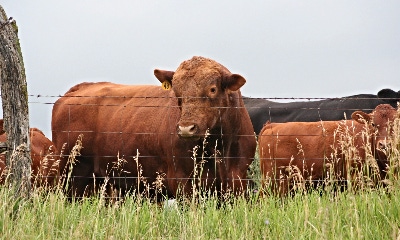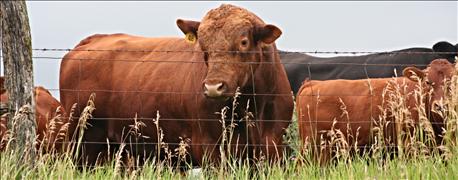
While many beef cow herd owners are in the midst of calving, it is time to turn the attention to the 2017 calf crop. In roughly 60 days, herd bulls will be turned out with cows and heifers. That means it is time to get your bull checked at a local Bull Breeding Soundness Clinic, according to University of Missouri livestock specialist Eldon Cole.
"To have those calves born close together and early in the calving season having the bull battery ready and rearing to go is critical," Cole says. "Just because the bulls were successful breeders in 2015 doesn't guarantee that same success this season."

BRING ON BREEDING: Now is the time to check bulls for breeding soundness--the 2017 calf crop depends on it.
He noted that the bulls are now a year older. Body condition over the year may have dropped. Bulls may have experienced an injury to their reproductive system. Or, they could have consumed ergot alkaloids and possibly had a disease that reduced fertility."
Cole says that all of these problems can be checked out by veterinarians as they do a thorough bull breeding soundness exam or BSE.
MU Extension set up a series of clinics to give cow owners assurance their bulls are ready to breed and settle females. At these BSE clinics, bulls will have the following 4 areas checked:
1. Testicles. These will be examined and measured. Scrotal circumference is correlated with semen output and serving capacity. Researchers recommend that a 12-13-month-old bull have a scrotal circumference of at least 30 cm.
2. Penis and prepuce. Injury to this area can occur during the course of a year. One thing to look for is body hair accumulation on the penis. This may have developed due to riding activity. This hair can gather into a ring near the end of the penis. In some cases, the ring can cause enough constriction to damage the penis. Treatment consists of removing the hair ring, but if damage is extensive, the bull may not return to service.
3. Accessory sex gland. Vets will check for yellow and cloudy semen, which may contain puss cells. This may be an infection that needs treatment with antibiotics.
4. Semen. A semen sample is collected, stained and examined under a microscope for percent normal and motility.
BSE clinics will also provide booster vaccinations, internal and external parasite treatment if desired. Bulls can also be tested for trichomoniasis and have blood samples collected for DNA evaluations for an additional fee. Bull owners can also have hooves and feet inspected for soundness.
MU Extension livestock specialists will be at the clinics to visit about expected progeny difference or EPDs, bull buying, evaluate bulls for body condition and structural soundness.
Available BSE clinics in southwest Missouri include:
March 7 - Barry County Veterinary Services, Cassville, 417-847-2677
March 15 and 16 - Dake Veterinary Clinic, Miller, 417-452-3301
March 17 - Countryside Animal Clinic, Aurora, 417-678-4011
March 23 - Christian County Veterinary Service, Clever, 417-743-2287
March 24 - Animal Clinic of Diamond, Diamond, 417-325-4136
Please contact the clinic you wish to attend for an appointment.
The clinics are a cooperative effort of the veterinarians, Zoetis and University of Missouri Extension. For more information, call the Lawrence County Extension Center at 417-466-3102.
About the Author(s)
You May Also Like






